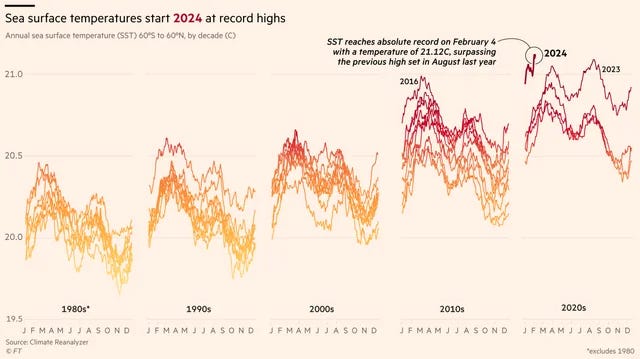Hi again,
This is the sixth volume of our weekly premium publication - Data Bits. Each week we’ll cover the most popular news in the world through various graphs, infographics, maps, and videos.
Here’s what to expect:
Largest Cities In The United States ( video )
The Rise of Sea Surface Temperatures in 2024
The Cost of a 30-second Super Bowl Commercial
The Most Streamed Spotify Albums Of The Year
Every EGOT’s Path to Win All Four Awards
The World Has Passed "Peak Child”
How Much Do Americans Trust the Media
Largest Cities In The United States
Credit goes to StatsPanda on YouTube
Can We Get Much Higher?
Recent data from the European earth observation agency reveals that, for the first time, the average global temperature has surpassed the critical threshold of 1.5°C above pre-industrial levels over the past 12 months. This alarming milestone is underscored by the fact that last month stands as the hottest January ever recorded.
The Copernicus Climate Change Service (C3S), headquartered in Brussels, reports that the global mean temperature for the period spanning February 2023 to January 2024 reached an unprecedented 15.02°C, exceeding the pre-industrial baseline by 1.52°C (1850-1900). This breach of the 1.5°C mark is particularly noteworthy as it is a pivotal target within the 2015 Paris Agreement, aiming to limit global temperature increases to well below 2°C, ideally targeting 1.5°C above pre-industrial levels.
While the recorded temperatures over the past 12 months surpass 1.5°C, it is crucial to emphasize that this does not signify a failure to adhere to the Paris accord. Scientists caution that the sustained period at this elevated level may suggest an expedited timeline to breach the Paris agreement limit.
Sir Brian Hoskins, Chair of the Grantham Institute at Imperial College London, interprets this data as a stern warning regarding the urgency of actions required to meet the climate targets outlined in the Paris Agreement. With eight consecutive months of record-breaking temperatures and the previous year being the hottest on record, addressing climate change has become imperative.
In light of these findings, Samantha Burgess, Deputy C3S Director, advocates for expeditious and substantial reductions in greenhouse gas emissions as the primary means to mitigate the rise in global temperatures. The scientific community underscores the need for swift, collective efforts to curb climate change and its far-reaching consequences.
Credit goes to Financial Times
Keep reading with a 7-day free trial
Subscribe to StatsPanda - Weird & Wonderful Data Insights to keep reading this post and get 7 days of free access to the full post archives.



